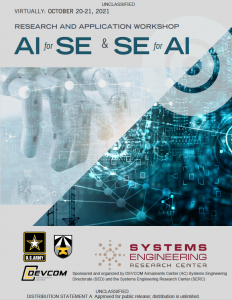The U.S. Army DEVCOM Armaments Center (AC) Systems Engineering Directorate (SED) and the Systems Engineering Research Center (SERC), a University Affiliated Research Center (UARC) for the Department of Defense (DoD) jointly sponsored the second Artificial Intelligence for Systems Engineering/Systems Engineering for Artificial Intelligence (AI4SE/SE4AI) workshop on October 20-21, 2021. The two-day virtual event gathered participants from Government, Academia and Industry to learn from leaders using AI in this space, share ideas and further explore outcomes that resulted from the inaugural AI4SE/SE4AI meeting held in October 2020.
The SERC Roadmap is a high-level, aspirational research vision linked to the goals of the DoD Digital Engineering (DE) Strategy and focused on how to prepare future SE processes for a world where humans and machines co-adapt and team to evolve complex missions in response to dynamic operational conditions. The objective of the workshop was to discuss and define Systems Engineering (SE) and Artificial Intelligence (AI) challenges, areas of exploration and methodologies to use, and ways to collaborate and research in the upcoming years.
In their work on AI and the future of systems engineering, SERC researchers Tom McDermott, Mark Blackburn and Peter Beling, take the position that “It is imperative that the SE community deeply understand emerging AI and ML technologies and applications, incorporate them into methods and tools, and ensure that appropriate SE approaches are used to make AI systems ethical, reliable, safe, and secure.”
As humans interact and team up with machines capable of learning everything from data sets to human, machine, and system behaviors, it is critical to be able to model the interaction, adaptation and co-evolution of the AI system with other relevant systems in the context of changing and unpredictable conditions. The workshop’s focus on the emergent trends in AI and machine learning through the lens of systems engineering is especially relevant to government, industry partners, and researchers who are invested in the applications of AI to produce better outcomes. Understanding the role of AI on the digital transformation of systems engineering, and the role of systems engineering in understanding AI as a system is key.
As noted in the workshop report, “Unprecedented technology generates uncertainty. Any loss of confidence and trust in new technologies and systems will set back progress. Safety is a primary concern, but there is a need to be practical about the level of confidence achievable and attention needs to be paid to the risks posed by not moving forward technologically and falling behind adversaries.”
In a February 2021 article entitled Building trust in human-machine teams by Margarita Konaev and Husanjot Chahal writing for the Brookings Institute the authors assert, “A holistic understanding of trust—one that pays attention to the human, the machine, and the interactions and interdependencies between them—can help the U.S. military move forward with its vision of using intelligent machines as trusted partners to human operators, advancing the Department of Defense’s strategy for AI as a whole.” They go on to state that “…trust can seem like an abstract, subjective concept that is hard to define and even harder to measure. Defense researchers and developers, therefore, focus less on studying trust directly and more on systems engineering approaches that ‘build trust into the system’ by making AI systems more transparent, explainable, and reliable.”
A unifying theme for the 2021 workshop was the increasing need for organizations and systems to be agile to keep up with the dynamic nature of AI toward the ultimate goal of delivering the most relevant and effective tools to the soldier in the field. Essential areas for focus emerged, notably: the importance of data—its acquisition, analysis and maintenance; the importance of the reliability of new systems to build user confidence and maintain global competitive advantage; and the need to update business processes, including workforce development and retention.
The jointly sponsored event was an opportunity for an in-depth exchange among and contributions by representatives of Government, Academia and Industry toward continued refinement and rich application of artificial intelligence and machine learning.

